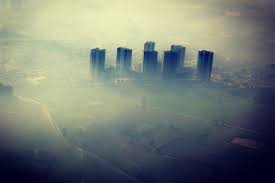After clean spell, air quality set to plummet in India's capital
Favourable weather conditions led to a rare drop in pollution in India's capital New Delhi, with residents last month breathing the cleanest air in at least four years but the authorities are warning that air quality is set to drop sharply in November. A delayed end to the monsoon, intermittent rains and a sharp pick-up in wind speeds ensured that the concentration of hazardous, small airborne particles known as PM2.5 in a cubic metre of air averaged 72 in October when air quality typically takes a turn for the worse.

- Country:
- India
Favorable weather conditions led to a rare drop in pollution in India's capital New Delhi, with residents last month breathing the cleanest air in at least four years but the authorities are warning that air quality is set to drop sharply in November.
A delayed end to the monsoon, intermittent rains, and a sharp pick-up in wind speeds ensured that the concentration of hazardous, small airborne particles known as PM2.5 in a cubic meter of air averaged 72 in October when air quality typically takes a turn for the worse. That was sharply down from an average concentration of 126 recorded in October 2020 - 25 times over the World Health Organization's safe limit - according to data gathered by the state-run Central Pollution Control Board.
But a confluence of factors, including falling temperatures, a drop-off in winter wind speed, and farmers preparing to torch farm waste of the previous rice crop to ready the field for planting the wheat crop, is likely to turn the air hazardous. "Because of frequent rains, most farmers didn't get to burn crop stubble, and now they have an even shorter window to dispose of crop waste," said Anumita Roychowdhury, an executive director at the Centre for Science and Environment think tank.
"As rains ebb, more and more farmers will rush to burn rice stubble, and that will happen when broader weather patterns will allow pollutants to hang in the air, resulting in a thick smog," Roychowdhury said. Poor air quality over the capital is a reminder of the challenges India faces in reducing pollution as world leaders meet at the United Nations COP26 summit in Scotland to agree on strategies to fight global warming.
Adding to the concerns, the Diwali festival of lights falls on Thursday when Indians will set off firecrackers as part of an ancient Hindu tradition. Delhi has banned the sale of firecrackers, but authorities rarely get to enforce such curbs.
"The October air was clean, but we're really worried about November," said a senior government official involved in framing policies to curb air pollution. "Stubble burning could peak right after Diwali." Crop waste burning accounts for about a quarter of air pollution in October and November.
(This story has not been edited by Devdiscourse staff and is auto-generated from a syndicated feed.)
ALSO READ
Indians driving digital technology growth in world: Assam Governor
Many Indians skipping second COVID shot despite record vaccine stocks
India scripts history; triumph of Indian science, enterprise, collective spirit of Indians: PM Modi on 100-crore Covid vaccine dose landmark.
New Delhi, Oct 23 (PTI) These are the top stories from the northern region at 8.30 pm.
EAM Jaishankar reaffirms India's commitment to United Nations










